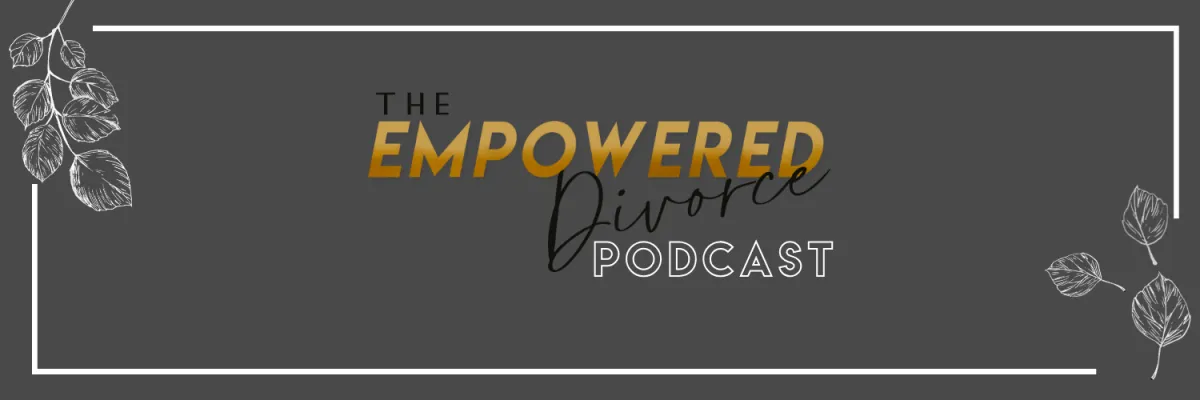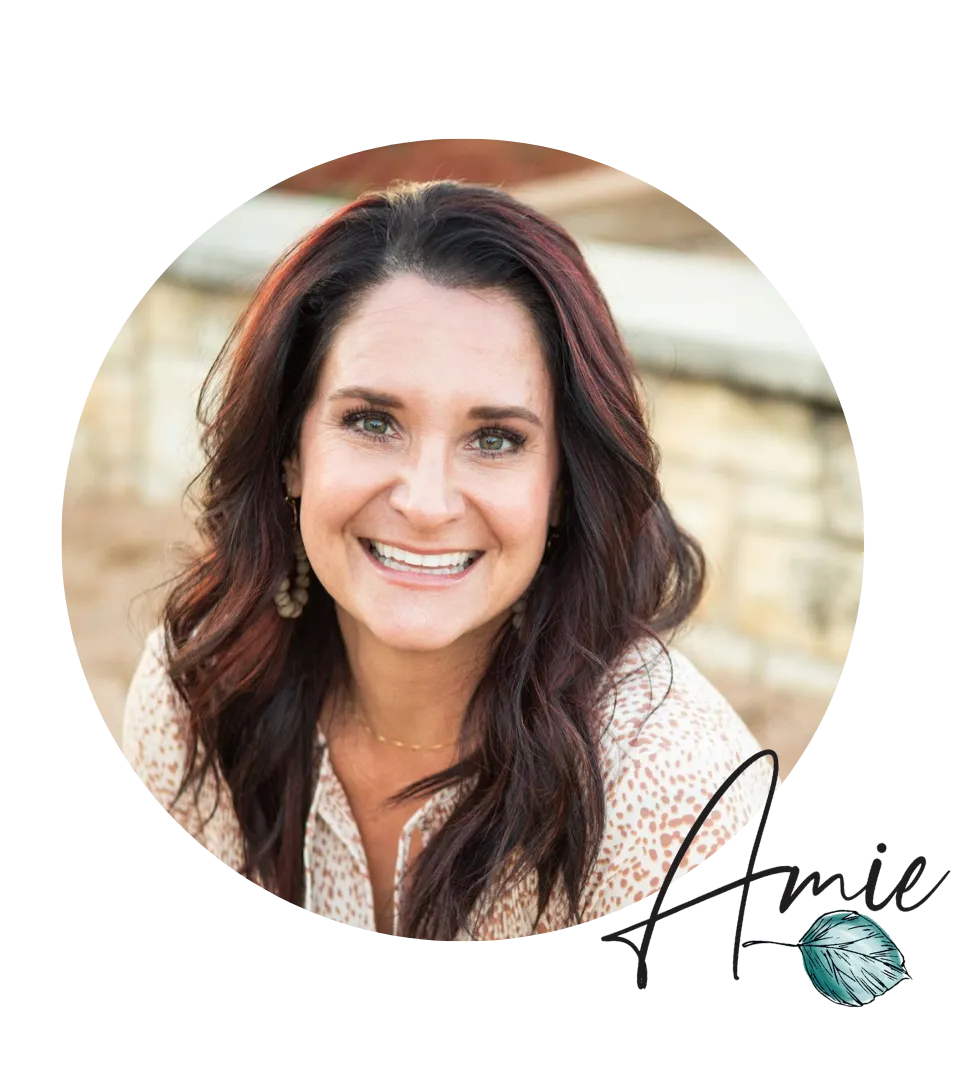
141. Grief Overlooked: Q&A Conversation
In this episode, I’m sharing a powerful teaching from one of my live Q&A sessions where we unpacked the real reasons grief still shows up—even when you're the one who initiated the divorce or knew it was the right thing. If you’ve ever found yourself asking, Why am I still grieving? Shouldn’t I be over this by now?—this is the conversation you need.
I walk you through five core truths about grief after betrayal and divorce, including:
• Why grief doesn’t mean regret
• How you can grieve someone who was harmful
• Why unacknowledged grief leads to emotional paralysis
• How to use a grief inventory as a tool for clarity and healing
• Why the body needs to mourn too—because grief is stored somatically
We explore how to move through grief with more compassion and agency, and why making space for grief (instead of judging it) is essential to healing. If you’ve felt stuck, confused, or exhausted by the emotional layers of recovery—this episode will bring clarity, validation, and a path forward.
Read Full Transcript
Hello. Hello, my amazing, beautiful listeners. Welcome. Thank you for joining me. Today I am doing something a little different. So the first Thursday of every month, I hold a free q and a where those of you that are in any stage of divorce can come and show up and find support. I always teach something at the beginning of every, of every session that we do, and typically whatever topic I bring tends to be the flavor of the entire session, and that's what happened this past month of May where I wanted to talk about grief, it was such a beautiful conversation. Around grief that I wanted to share parts of this q and a with you all, of course, to protect the anonymity of those that show up.
I did cut out names and their voices and tried to fill in the gaps with, asking questions for them. there's a little bit of, little choppy today, but I felt like most of
the content that was shared and shared in response to some of their questions was really beautiful and worth putting here on the podcast for all of you. and also to invite you to join us a first Thursday every month to o'clock central time.
a lot of women that I work with are still feeling, feeling very confused that they are grieving even though they maybe wanted the divorce or know that they needed to divorce. And so went over five things that can help normalize the emotional dissonance that a lot of you might be feeling.
I just wanted to offer some insight on why naming grief is so essential to moving forward and to getting that, clarity and also stepping into ch, stepping into choice, stepping into your power, despite grief. The five things that I go over today, I'm gonna name them quickly so you can wrap your head around all of them, and I'll put them in the show notes as well.
But the five things I'm gonna talk about is why grief doesn't mean regret, how you can grief someone that was harmful. How unacknowledged grief is going to lead to emotional paralysis. How important and why it's important to do a grief inventory, and how the body also needs to mourn as well. So I'm gonna dive into those five things as well as answer some questions that go along with this topic today.
I hope it is helpful for you.
If you want to take advantage of the worksheet that I made for the ladies that are registered, you can go ahead and go to amy woolsey.com, register for the q and a. You'll get access to that portal and the workshop is in there. And then the next q and a you will get an email reminder to join us.
All right. Here is the live q and a.
Hello? Hello. Okay. I think I caught everybody's face real quick. , I think you put your face on there. Yeah, you did. Just checking. Hi. Alright, so hello. Welcome. Glad you all are here. What I wanna share with you all today. If you haven't been in the portal where the recording gets put, I have a PDF in there on. So when you get in and you go to May. There'll be the recording and then on the right side will be a document that I uploaded a PDF that will go along with what I'm talking about here, so that you don't have to like, I mean you can take notes, but I have a worksheet in there for y'all.
I don't always do that, but I wanted to give you a little extra something to work through some of this ' cause I wanna talk about grief today. It's interesting in the work that I do, I don't think this is a coincidence at all the way that this happens, but there tends to be themes sometimes even themes of the day where every client that shows up there tends to be, there's a theme of grief or the theme of acceptance or the theme.
And it's really, again, not a coincidence, I don't think at all. Lately there's been this grief theme that has been coming up, and when we're grieving a life-saving divorce, it can be really confusing. There's some aspects and elements of grief that I think sometimes gets either, like, we judge ourself, shame ourself, we miss it.
We don't even recognize it maybe as. Part of grief. So I just wanna go over a couple things that I see generally are the most common just to point out. And like I said there's a worksheet in there, in that portal for you, the first point that I wanna make something that comes up a lot is that when.
Especially those of you who chose to move forward with divorce, like you're the one that kind of like, pushed the button, filed the paper, whatever that is, grief will come, emotion will come. And I hear sometimes women say things like, well, if I'm sad, does that mean I made the wrong choice? We often correlate those negative emotions or emotions of grief as something wrong.
And so grief is not a sign for example, I remember thinking, well, does this, do I want him back? Like, why am I so sad? Like I, I was so over all of the behaviors and I was starting to become aware of how toxic the behaviors were and. All the things. And then there's the grief and it just confused me because why am I sad when he's acting so awful?
So I see this keep women really confused Sometimes it doesn't mean that you want them back, it it a sign that something meaningful to you was lost, even if that something turned out to be. A dream that you thought you had, the reality that you thought you had, you can be grieving the time that you gave, right?
The, the amount of time and energy in your life that you gave to this person, the version of yourself that you gave, the love, the hard, the trying so hard, the version of you that you imagined. Experiencing in your future grieving the belief that you thought that you were safe with this person, that you thought that you guys were on the same page, right?
So this isn't, this kind of grief isn't about returning or going back. It's, it's, again, it's a grief that we need to metabolize your central nervous system, your soul processing the reality that was hidden, that was hidden from some of you for. Decades, couple of decades. it doesn't mean regret.
So if that shows up for you try to reframe that because I see a lot of times women get stuck. The next one that I see happen a lot is you can grieve someone that was harmful. And that is another weird paradox, right? It's like. Wait a second. He caused so much harm. Why am I sad? He caused so much pain.
Why am I, why am I grieving again? When we think that way, we can get stuck and not wanna grieve, and then we have all of these other problems show up. So this one again, is one of the most dis, disorienting realities of betrayaled trauma. You're mourning someone who hurt you. It's confusing. Shame can show up with this one.
their harmful behavior. You're grieving the version of them that you believed in, the person that they pretended to be person, that they used abusive behaviors to get you to believe that they were the one that made promises, that made commitments, that made covenants that weren't kept.
And so you were attached to who they, who they wanted you to believe they were, who they showed up as, not who they really were. Many of you are finding out who they really are once you started to file the papers, right? So, this kind of grief is valid. It's still necessary because again, healing requires.
Letting go of the that false hope and ideal so that you can then start to reclaim that that part of you that did hang on with really beautiful, beautiful in integrity and intentions. The other one is unacknowledged grief. So when we don't look at it, which happens if we are judging ourselves in any, again, this of these other areas, unacknowledged grief.
Is gonna lead to emotional paralysis. It does not go away. You cannot avoid it. You cannot outthink it. Outsmart it. Outlearn it out. Podcast. Listen to it out. Righteous it. You cannot. I am so sorry. And sorry, not sorry. Because when we really allow grief to validate, and we're gonna talk about that next one, validate the loss.
There can be a real honor that you gave to this relationship. it's important in grief from something like this to be able to honor your part, your role, your love, your integrity, your values, the way that you showed up. when we ignore it, when we don't acknowledge it, when we don't acknowledge those losses we don't name them. They start to leak out all this, all this pent up grief and all these emotions that are stuck, they start to come out sideways and it can look like resentment.
It can look like those obsessive ruminating loop thoughts, confusion, apathy, and then physical illness, right? So, unfelt grief, it's gonna freeze you in time, freeze you in your place. I know that many of you want to move forward, are ready to move forward. Your body might be ready to move forward.
And so we need to allow that, those emotions to be felt, which is why grief needs an inventory. We need to use grief inventory as that self-awareness tool. it isn't just about missing. The person or grieving the, the person that we thought we had or wanted or the life really is all about missing what was built around them.
And so one of those things that I think I have in that worksheet is to list some of those losses that you might feel like you are not acknowledging Maybe there's a couple things that you are resisting in terms of letting go and acknowledging that it's a loss. It can be financial, right?
A lot of times y'all situations financially change and we don't wanna grieve that. We're angry, we're pissed. We're maybe still trying to figure out how to make it work, but it's also a loss. it's important to acknowledge that as well en enlist it. And then the last one that I wanna just mention that I see sometimes really get ignored is the body. Y'all know how much I love talking about. Body work, body healing and getting in our bodies, and this is a big one, our body needs to mourn too. So we have our thoughts, the dreams, the hopes, the ideals, the reality our heart, the betrayal, the love, all of those things.
But our body needs to, to mourn too. It isn't just mental, it is somatic. when it is in the chest and it suddenly tightens or the stomach that. just drops without warning or the jaw that you didn't realize was so clinched all day long. We need to look at that, honor it, not try to change it, judge it, make it go away.
But really just acknowledge it, honor it. Trauma gets stored in the body when you've experienced so much trauma from this grief is riding shotgun, it's right there. We're we do so much bracing and holding right here that we don't even realize it. And so letting the body talk, letting the body feel, letting the body grieve, letting it mourn, asking your body, where does grief live in me today?
As I go throughout my day and I'm navigating this journey? Where does grief live today? Look for it. Sometimes we're, we're working so hard to avoid it or get through it or get past it. It, it's gonna feel weird to say, where are you today? Right. Good morning grief. Where are you living in my body today? I know wild, but I really wanna encourage you to do this 'cause it's there.
The other thing just along with this that I've been noticing, like I said, is this trend lately with grief is I'm hearing a lot of like, thought I was over this by now, thought I did this. Like, I cannot cry anymore. Freaking tears. Why am I crying again? And that's the other miss. Big, big, big, big misconception around grief with this kind of divorce is that you're unpacking so many freaking layers.
grief is gonna be in every layer that you unpack again, when we can reframe grief and allow grief to be. This beautiful validation of how you loved and how you showed up. Because it wouldn't be there if it wasn't important, if it, you didn't hold it in high value and regard. And I just think what a beautiful thing to own in how you showed up in that relationship, right?
Like you loved, well, you loved pure, you loved within your values. You, you, you, and grief is validating that. I think there, there can be a really empowering shift with grief I see sometimes people view grief as like, this boat in the ocean that's just sinking and it just has all these anchors and it's heavy and it's just like, oh my gosh, can we just get rid of it?
I would love to encourage you to, to reframe it. Differently because it's not going away. I know if it needed to or if it was healthy to, then I would be putting all the things on the board to help you make it go away. Right. Instead, I'm like, this is how we feel it. So it, it's a beautiful and can be a beautiful part of your healing from this kind of divorce.
thoughts, questions, feelings around what I shared.
So of course to protect the anonymity of all of those that joined the group , I'm going to ask her question for me. So at this point, one woman in the group was going through mediation and she wanted to know, she felt very confused because for the most part, what she wanted she got.
so she was thinking, well, I should be relief. I should be feeling relief, not grief. Why am I feeling grief after mediation? as I guided her to reframe based on what we had just talked about with grief, she came to the conclusion of, well, now that she's not feeling all of this fight response, going into divorce and going into mediation and having to fight for everything, it made space, for her to start feeling this kind of grief, And gave her a chance to feel it.
First of all, that makes so much sense, right? Hearing you say that, like, I just wanna validate that conflicting , experience, why I should be feeling relief. Why am I feeling grief? Something you said there too reminds me of how easy it is to absorb their grief. The majority of their grief is they're grieving the loss of power. And right. Control. So it's gonna feel like grief to them.
What they're grieving is a loss of power and control that they don't have over. and knowing your story, I, yeah. Guarantee that's what's going on. So I think it, it is just, again, in this kind of divorce, we're constantly have to reminding, remind ourselves to step in our truth and our story.
Because part of this lifesaving divorce is that we've got sucked into theirs. divorcing and the emotional divorce is separating our story from theirs, our truth from theirs, our reality from theirs, right? And so even in this process, you can get sucked into their reality of the process as well.
It, because it's the pattern, it's the cycle. So that, that makes sense to me. Okay. And that's what I'm hearing with this confusion. Honoring your grief or loss, which is why it needs to be inventoried, is so important. Like literally write it out. List your losses.
Thank you for your comment. Anybody else, thoughts, comments, questions?
A woman asked this question, made a comment about how she's noticing that grief is starting to creep back in, and she's noticing that sadness and that maybe part of it is realizing that the divorce is getting closer, and also recognizing that it was her anniversary month she mentioned how she was a little shocked that grief was coming back in as she thought that she had, you know, done all the work.
I've written out my losses. if grief is back, does that mean that I have more work to do? And so I asked her what she thought about that. Does she think she has more work to do? And she concluded that, there's always work to do, and yet she felt like maybe it still shouldn't be there. And I asked her about the last grief point that I had made around.
How the body needs to mourn. she said that she actually did notice a lot of grief coming in towards her body. I started to ask her, what did you do with that? What did you do when you noticed that grief in your body?
She said it was just interesting that it came back and that it was so prominent and so strong. And so she tried to journal and ask like, what's really going on here? Why is all of this showing up?
Then I asked, well, what do you wanna do with it? she said, well, I want it to go away. I wanna give it away because it is not fun. then here's what I said after that.
So this is gonna sound super weird, but I wanna invite you to encourage grief to be there. Allow it to be with you rather than trying to make it go away.
So when you notice it's there in your body. I love what you said. Interesting. You're like, cur, there's curiosity. So beautiful, interesting. And then it makes sense why it's there. You're putting some pieces together. It's the anniversary month. Describe it in your body, the texture, the temperature, the color.
then I want you to make space for it. Let it be there. Welcome. You can stay, you can stay as long as you need to. Doesn't that feel so totally opposite. Of what we want. I know, right? Your face is like, what the fuck? Right, right. So like, I get it. And this is that paradox of healing.
We need to make space for it. that means welcoming it without judgment, shame or blame,
and allowing it to be there. ' cause when we avoid it, that's what I mean by like this. Unacknowledged leads to emotional paralysis. Avoiding not acknowledging, pushing, shoving, wanting it to go away is gonna create additional suffering that's unnecessary.
When I hear clients start to describe their experiences, like too much overwhelm, flooding, hands down. When we start digging, it's because they've been shoving, avoiding and resisting. Rather than actually feeling,
just take a little time to get more curious about that with you. Beautiful job of recognizing it in your body, being curious about it. I'm gonna invite you to go just a little deeper with, describe it in your body, like wear jaw, chest, stomach, hot, cold, fast, slow. Does it feel like a lump swirly, stabby, spinny, pinchy, right.
Really describe it. then I like to put my hands over where I'm noticing that just helps me draw all of my attention and awareness to it even deeper. So if it's like right here, I'll just kind of like, Ooh, there it is. I see you. take a deep breath. And when that, when you breathe in.
Imagine you're literally making space for it. So I'll breathe in I'm creating more space for it. When we see it and we don't want it like watch your body, your body's like tightening up around it and it, our body like goes right. I see that where there's dis, this is where we get disconnected in our body too.
Like our chin wants to go down. But our body is going backwards. We're disconnecting even in our body when we're resisting these emotions. So taking that deep breath and opening up and making space oftentimes will automatically align your head and body as well, which is what we want. make space then welcome.
I see you. Makes sense why you're here. It's anniversary month. Take another deep breath. Make more space. You can be there in my chest. You can be purple, you can be swirly. We're we're, we gotta go take a shower now. But you can be here. I see you.
It's okay. I want you to try that. Just see what you notice. Keep practicing. I don't care if five minutes later you're, you're noticing you're back to like, right. Get away. Get out. This is stupid. This is so annoying. Just notice that practice again. Okay. I was trying to make you go away.
It's okay. You're here. I know. Why Just keep practicing.
That's the work. Questions about that? This is a big one. This body one's a big one. Our body needs to mourn. In order to do that, we have to be in it.
Any other thoughts or questions about this for this topic?
One woman chimed in and said, okay, but then what do you do after that? Like, what happens after that?
So what often happens when we, shift the energy around it? Really great question . When we shift the energy around it, where it's more acceptance, what I just did there is acceptance, right?
That's the principle of acceptance and it moves you into choice and agency. this is the energy that I see. Notice we give it when we do that is it loosens it up. The resistance, the avoidance, the reactiveness, the judgment, the shame, it tightens it up it makes it harder when we accept it, loosens it, it can move.
And so what I notice is that it won't be as tight and like k. It'll loosen a little bit and it can then move. Your body knows what to do with it. our human bodies are just, oh my gosh, they're amazing. They know and are designed to know how to handle this energy. Remember, emotion is energy and motion.
It knows how to move the energy of grief. When it stops moving, it's because. You've stopped it.
when you make space, you allow, you accept it will move through. It doesn't mean that it moves through and goes away, but it moves and it heals. Remember, it's telling you something and sometimes we miss the part of listening. Right. We just don't like the, the feeling of uncomfortable, but we are missing what it's trying to tell us.
For those of you who've been with me forever, I'm, I know you've heard this analogy so many times, sorry, but it's, one that always comes to mind because it's so true for me in my emotions, at least, like when my kids were little. They were too lazy to come find me, so they would just stay in their place in the house, and she'd be like, mom, mom, mom, mom, mom, mom, mom, mom.
And they would just get louder and louder and louder. Heaven forbid they move, but they would just get louder and louder and louder. And that's what oftentimes I see our emotions do when we're ignoring and not listening. They just get louder and louder and louder. so when we listen, they don't need to speak as loud.
They might still be present. this is what I was saying earlier, I think it was a like, this is the additional suffering that I don't think we need to experience with these emotions. This is the principle of acceptance
when.
Hesitate offering this because what I see happen when I do, ' cause all y'all just wanna go to the agency pillar and just start doing. 'cause ultimately you still want it to go away. But when you really practice the principle of acceptance and you listen, you validate new love and you right the part, the feeling, whatever, when you are ready.
Then you can start to shift into what you want, what you wanna choose. So for example, and years ago, my coach would say, until you can get to the place where you really truly can say high grief, it's really is okay that you're here with me all day. Like not just saying it to say it, but like, you know what?
It really is okay. Like, I get it. It's uncomfortable, but I know why you're here. And it's okay. we will just do grief today. And go grocery shopping and go to work and all the things, like, that's when you know you're ready to maybe lean into this agent choice step. Okay. So at that point, I would do something like, I do this a lot with my anxious part.
I see that you're here and it makes sense why, and I spend some time in it and all the things that I just walked you through. then it's I can step into some reframe. Because when you get to know what the part is telling you, now you know what your thoughts and beliefs and maybe limiting beliefs are.
Now we can work on reframing. 'cause your thoughts are what create your emotions outside of a trauma response. Your thoughts create your emotions. And so at that point I will start to practice thinking something maybe differently. Not to invalidate, but to shift. Does that make sense? And so it might be like, trying to think of an example.
All right, well, let's see. What did I just do the other day? Because my ex is coming back into town. He only comes into town when it's time to take a picture for his new dating site to make it look like he is showing up for his kids and it's graduation. So he gets to take that snapshot, put on his dating site and pretend like he is been involved in his entire high school crick.
So he's coming into town and I noticed all these emotions coming up, right? did the whole thing let them be there? So my reframe is. Especially around what I know he does with, with the picture he takes it's okay. Like it's okay that, that he takes a picture and he posts it and his story as he's involved.
It doesn't diminish what I know about my involvement with my son. It doesn't take away The work that I've done to raise my four children, I'm by myself I got my baby graduating and I am so proud of the work that I've done to get that kid graduating because that's a feat. It's really surprising that he is graduating so kid hate school, so I'm, I can be so proud he doesn't get to take that away, but I need it to feel.
Anger and resentment and bitterness and disdain, right? I needed to feel that instead of talking myself out of it or shaming myself or telling myself I should be more Christ-like.
I didn't wanna rush that process, so I spent four days.
Doing a lot of anger work and really letting that part be with me. Like, she's so right. She's so valid. So I let her hang out. She was here for a while
she doesn't really need to hang on right now. Like she's, I can see that she's like. created some distance from me I have a lot more pride and love that has shown up. ' cause I'm super proud of that kid and I got to witness every hard, beautiful day of his life. He can have the picture.
It doesn't take away from what I saw every day.
So that's an example of like how to let it move through in those pillars of awareness, acceptance, and agency.
Does that make sense? Okay, great question.
Thank you for allowing me to share my personal experience with that. Sometimes it's easier just to walk you through what I've done to help explain it.
When I wanna avoid something, I just tell myself that's attached to suffering and it helps me go. All right. All right, all right, all right. Time out, Amy. any other thoughts or questions?
Next were some beautiful comments around how some women notice that just taking a break, that when grief feels like it's so much being able to push the pause button, is being able to push pause button on some of the heavy lifting that they were doing around all of this grief work because like I said.
Because we all know that sometimes we just have to get other things done. The most important part is to not push pause on it and never come back to it. But there were a couple beautiful comments about shared experiences around just pushing the pause button.
. I love it. Oh, so great. I love those active recoveries. It's like what, I think what you were saying too, like. In the world , of weightlifting working out when we're doing this like strenuous muscle pulling workouts to rebuild, right?
Like in the world of workout, , it's encouraged to literally stretch your muscles to where it's painful. Like pain is a good thing in the world of workout and weightlifting and training, but. We need to also have what we call active recovery days where we're ,
not, not doing anything, but we're doing slower.
Not straining muscle, pulling pain movements. yoga, we're walking, we're stretching. And that's exactly what I heard you say, is like, you're doing the slower active recovery stuff. You're not not doing anything. And I you too, like. I'm sure you were filling that space up with, with your own like heart mind, right?
Thoughts instead of relying on other people. So I love incorporating active recovery in your journey and sometimes taking a break from all the psychoeducation. So important. Love that you shared that.
I totally am in the, when is this going to go away? Yep. Yeah, I know.
Yeah. I hate that over a decade of doing this work myself. Sometimes I hate telling women who are in the thick of it, like, there's no arrival surprise. and trying to kinda like dance it out, I just, I, I know that if you continue to do this work in self-love, ' cause you're never gonna hate yourself into change.
the change is gonna come when it's more rooted in self-love. that includes loving yourself in the grief and it isn't as dark and heavy and daunting. It becomes more validating and meaningful.
It's validating something that you love when, when it's a loss, you love yourself in it.
Any other questions that you have for me today
one last question that was asked in this q and a, a woman was noticing that especially this past week, more stuff was coming up and she was looking at her marriage and everything and all of the patterns and the things that she has going on. And then it made. Led her to looking at C childhood stuff and things that happened with friends and just everything, and she just started to end up feeling very overwhelmed and she's not quite sure what she should be tackling first in terms of how to process this journal or ask worthy emotions are coming.
she just didn't know where to start and wondered if I had any recommendations. About that, just in terms of how to go about pulling all of that apart and deciding what do we look at first?
you'll hear my response after I have asked her several questions, just to get her to self-reflect look at what she was describing to me from a little bit of a different perspective.
Okay. The reason why I am asking all these questions is because we need to make sure. In our self-awareness when stuff like this happens is that,
that we're not judging ourself in the swirl or because of it and making that mean something about us intrinsically. Because of this, I'm doing something wrong, or I'm not doing it right, or what's wrong with me? You just be really mindful of what our judgment or perception is about this, because what you're describing doesn't is part of this.
Right. And so I think, Do you know where I'm going?
So what she concluded from our back and forth conversations and with some questions is that when she was feeling the swirl of everything and how all this part of her was showing all the other things in her life that were going wrong. She noticed a judgment part. A judgment part that's like, you know, not only has your marriage failed, but everything else is a complete failure.
And so her being able to look at that from a different perspective
it really helped her shift out of that spin that she was talking about.
I'm so glad you brought this up 'cause this is a perfect example of. How subtle and quick and easy it is to go into the fix it, make it go away,. And look at the information that you could have missed. Mm-hmm. So we just slowed it down and got curious and now you can see that we're attaching some self-judgment to so many areas of your life, hence the swirl.
I would, to answer your question now, I would encourage you to slow down, take a breath and place hand over your big, beautiful heart and just let yourself know that you are okay. You got a lot going on. Hmm. Let judgment part know that I see that you're, you're noticing a lot.
That's going on right now. I've got it. We'll be okay. One step at a time. Just gotta slow down. 'cause that's hard. That is so hard to slow down when there's so much swirling and moving fast.
Okay.
Thank you for showing up for yourself and each other in this space as well. For those of you that are interested, the Dating from Within Workshop, I did come up with a date and it is June 12th, 13th and 14th. Can go to the website and register, find out more. Remember, this is all about connecting back to you and dating you.
I will see you all next month. Thanks, y'all.
Wasn't that such a beautiful tender session? I wanna, again, thank those that participated in that monthly free session. wanna invite the rest of you to join us. It's a beautiful, powerful way to connect and not feel so alone in all of this. And. I just wanna remind everybody that grief is layers.
the question I get all the time is, when will this end? As long as you are human and as long as you have a human brain, you will expect human grief. How long will grief last going through divorce? There's no answer to that because every single one of your situations has multiple layers, as long as you continue to do your work and your healing, you're gonna see the layers and are able to grieve.
So in a way, as you continue to do your work, you'll continue to see the different layers and able to step in and grieve them. You're going to have a thousand funerals. Allow yourself to have the funerals make space to grieve. Every single thing that you acknowledge that you're losing, how you do that and how creative you wanna be with that is completely up to you.
I've had some clients be very creative with their little mini funerals. You can. Bringing something, a picture, a note, a letter, a memento, a dresses, wedding dresses, whatever you want to bring into that funeral with you. I've had clients, I had one client, Buy an urn and every time she had a mini funeral, she would burn whatever, whether it was the letter, the eulogy, the picture, and she would put all of the ashes in the urn and she just started collecting all of the ashes.
I thought that was actually really beautiful. . So get creative and do whatever you feel like would be validating for you when you have a loss that has come up to the forefront of your mind and in your body, and allow yourself to grieve it.
Some of them might not need so much detail going into a mini funeral. Sometimes you can do this when you're driving in the car, in the pickup lane. Sometimes you need a weekend. Don't put a timeframe or. A stigma, an expectation around any of it.
Trust yourself, lean in and trust you to know what you need in order to process and grieve whatever is coming up. Every shift out of a divorce is going to provide, most likely provide an opportunity to grieve. Your partner gets their own space and the kids move into it. The partner gets a new partner.
The divorce papers come in, holidays, kids activities. There are so many things that are going to be different that will require grief. I also. See a lot of opportunities for grief when the reality of who this person was and how they showed up in the relationship versus the reality that they wanted you to see or that you really, really wanted to believe is starting to collide when you no longer can hold on. To a false reality. And more and more, you're being forced to look at the real reality.
Grief is going to be tagging along. Ignoring that is also gonna perpetuate a level of suffering that you don't need to do, that you don't need to experience. So I noticed that was a big part of my experiences as well. There were things that I didn't want to see in my ex that I.
Really, if I looked at it and saw it and accepted it, then it would, then it would mean something about me and I needed to dig into that and separate his behaviors, his choices, his actions from me and who I am, and the way that I loved and the way that I showed up. It's a process. Please be patient with yourself in this process of healing.
You're not alone. You're not crazy. I know a lot of people might be even saying to you, why are you still grieving? You should be over this by now. You'll know when you are ready to move forward. Trust yourself. Trust your body. You'll know when you're ready to bury it and create something new.
Because you can create the life that you want. You can create the experience that you wanna have with grief, and you can create something different when you're ready and when you choose to, because you can take care everybody.







Facebook
Instagram
Youtube